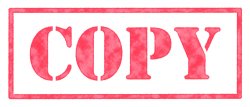A little while ago, we had a great guest post here by Jason Cohen titled “Why
Your Startup Shouldn’t Copy 37Signals or Fog Creek”. In it, Jason makes
some great arguments on why you shouldn’t copy successful startups like 37signals. I (mostly) agree with Cohen. Blind
copying just doesn’t work for reasons Jason Fried (CEO of 37signals) outlines in
a follow-up article. 
Here’s what Fried had to say:
“Here’s the problem with copying: Copying skips understanding. Understanding is how you grow. You have to understand why something works or why something is how it is. When you copy it, you miss that. You just repurpose the last layer instead of understanding all the layers underneath.”
I (mostly) agree with Jason Fried too. When you copy, you do miss a lot of what made what you are copying successful. But, although copying specific things is ill-advised, drawing inspiration from and copying certain practices can often work quite well.
Here are the things I think you should copy from 37signals:
1. Share your expertise. Whatever it is you are passionate about or an expert in — share your information. Contribute to the community. Help others learn. Blog, podcast, speak — whatever works for you. Jason and the 37signals team are phenomenally good at this. They blog, they speak, they wrote a fantastically practical book.
2. Be your own customer. Try (if you can) to eat your own cooking. A product works out much better when you use it yourself. Solve your own problems. Fix the things that annoy you the most. Beyond just 37signals, there are lots of examples where people built software that succeeded in part because they use it themselves. GMail comes to mind.
3. Minimize unused inventory. Don’t write a bunch of code that not a lot of people are going to care about and you don’t need today. We have a tendency to “design for the future” and add features or architectural elements with the expectation that they’ll be useful someday. Wait for that day. You might “overpay” if/when you do get around to needing it (because it’s more expensive to add things later), but on average, you’ll be better off not writing that code that you don’t need just yet. This is not an excuse for poorly designed software — it’s an argument for being selective as to where you design in future expansion.
4. Take a stand. Have an opinion and take a stand. 37signals does a great job with their “less is more” stance. They have a passionate position and are willing to defend and debate it. You don’t have to take extreme positions on everything, but there should be something you feel passionately about that you don’t just pick a happy, non-controversial middle-ground. Ideally, it’s this particular idea that your startup is centered around.
5. Charge early, charge often. There is no shame in putting a price on your product. Doesn’t matter how early it is. Just give customers an easy way out. Let them decide whether your product is worth paying for. If not, keep cranking. Too many startups feel like they need to have the “perfect” product before they can begin charging for it. That’s almost always a mistake. Charge early. Once you start charging money, all sorts of good things start to happen (for example, customer feedback starts to happen, because you actually have customers). Then, try to charge as often as possible. Instead of “big chunks” of money changing hands, try to move to smaller, recurring chunks. Many SaaS businesses function this way (with some sort of subscription or “pay by the drink” model). It works.
6. Contribute Some Bits Back: As you know, David Heinemeier Hansson, a partner at 37signals is responsible for the phenomenally successful Ruby on Rails. This benefits them more than the “positive karmic loop” thing. By contributing to the open source community, they’re able to leverage the power of that community and make the platform they use for their own stuff much better. But, please don’t misunderstand me. I’m not suggesting you should go out and try to build some platform/framework. In fact, please don’t try and go do that (99.9% of us should not be obsessing over building platforms/frameworks — particularly folks like you and me). Just find ways to contribute back — even if they’re small ways. It’ll help in at least two ways: You’ll develop better stuff and you’ll attract better people.
7. Build A Community: Software companies these days are about more than just the product — they’re about the people around the product. This includes both those that built the product’s users. Invest the time and energy to foster a vibrant community that connects the people that care about you, the company and the products. Allow customers to engage with each other. This is useful not just from a “more value in the software” perspective — but it also helps with respect to competition. If a big, 900–pound competitor comes after you some day, it might be easy for them to build some of your product features, but it will be much harder for them to steal your community.
Are you a 37signals fan? Did you read “Getting Real”? If so, what other practices or philosophies do you think they use that most other startups should emulate?